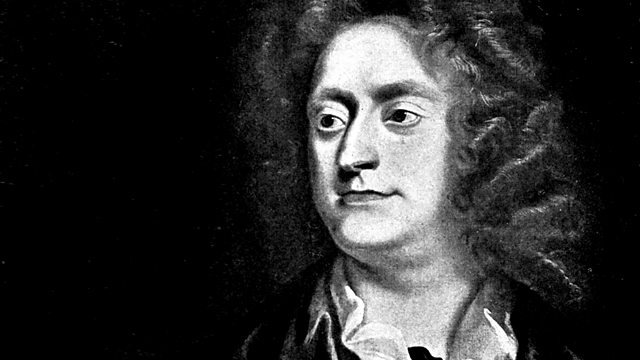
A New Queen
Donald Macleod considers how the start of the reign of William and Mary heralded a change in musical direction for Purcell.
Henry Purcell's stageworks: William and Mary's accession heralds a change in direction for one of England's most brilliant and respected composers. This week Donald Macleod charts Purcell's activities during their reign. Cutbacks at court meant fewer commissions, but even though Purcell was asked to write less church music, he was able to cater admirably to the Royal taste for music for special occasions and write prolifically for the theatre.
Walk along the North Quire Aisle of Westminster Abbey and you'll come to the tablet commemorating Henry Purcell. One of the pre-eminent musicians of the age, he died, unexpectedly and tragically early in 1695 at the age of 37. Yet despite the brevity of his life, Purcell left behind a rich musical legacy. Indeed, with little in the way of biographical detail remaining, it's through his music that glimpses of his character emerge. He was a gifted and prolific composer who wrote with skill and imagination for the opera, the church, theatre, royal patrons and even small domestic forces. Born a few hundred yards away from the Abbey, just south of Tothill Street, as a child he survived the Great Plague and the Fire of London. A chorister of the Chapel Royal, he went on to hold positions at court and at Westminster Abbey over three reigns, Charles II, James II and William and Mary, seemingly able to weather the political storms and prosper under each successive monarchy.
Today Donald looks at Purcell's activities at the start of William and Mary's reign. Asked to provide music for their coronation, Purcell relied on a crafty bit of recycling, serving up an Introit he'd written four years earlier for Mary's father, the now deposed James II. Shortly afterwards he did produce something new, the first of a succession of annual birthday Odes for the new Queen. Meanwhile, he was looking beyond the court to rekindle his interest in the theatre.
Last on
More episodes
Previous
You are at the first episode
Music Played
-
![]()
Henry Purcell
Come ye sons of art away - birthday song for Queen Mary Z.323
Performer: Trevor Pinnock. Performer: Alison Balsom. Performer: The English Concert.- EMI 4403292.
- EMI.
- 6.
-
![]()
Henry Purcell
I was glad - full anthem for chorus
Conductor: Martin Neary. Choir: Choir of Westminster Abbey.- SONY : SK 662-43.
- SONY.
- 1.
-
![]()
Henry Purcell
Amphitryon, or The two Sosias - incidental music Z.572
Conductor: Roy Goodman. Ensemble: The Parley of Instruments.- Hyperion: CDA67001/3.
- Hyperion.
- 19.
-
![]()
Henry Purcell
Dido and Aeneas - opera in 3 acts Z.626
Singer: Janet Baker. Conductor: Anthony Lewis. Orchestra: English Chamber Orchestra. Choir: St. Anthony Singers.- DECCA : 425 720-2-.
- DECCA.
- 16.
-
![]()
Henry Purcell
The Prophetess, or The history of Dioclesian Z.627
Director: Roy Goodman. Ensemble: The Parley of Instruments.- Hyperion: CDA67001/3.
- Hyperion.
- 1.
Broadcasts
- Mon 9 Feb 2015 12:00����ý Radio 3
- Mon 9 Feb 2015 18:30����ý Radio 3
Beethoven Unleashed – the box set
What was really wrong with Beethoven?
Composers A to Z
Who knew? Five eye-opening stories from Composer of the Week
Five reasons why we love Parry's Jerusalem
What is the strange power of Jerusalem which makes strong men weep?
A man out of time – why Parry's music and ideas were at odds with his image...
The composer of Jerusalem was very far from the conservative figure his image suggests.
Composer Help Page
Find resources and contacts for composers from within the classical music industry.





